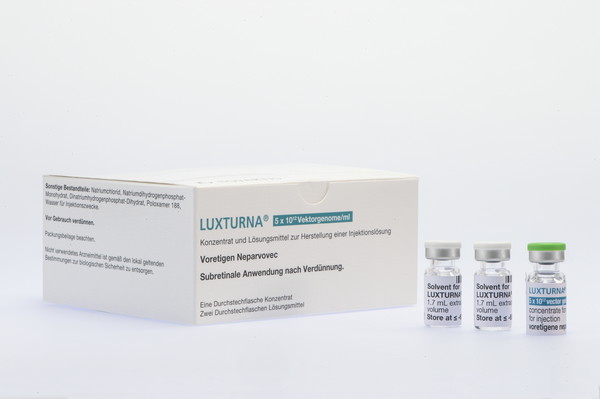Novartis Korea said Thursday that the Ministry of Food and Drug Safety has approved Luxturna, its inherited retinal dystrophy (IRD) treatment.

According to the company, the approval marks the first IRD gene therapy for patients with RPE65 gene mutation and has sufficient retinal cells in Korea. The ministry based its approval on phase 3 clinical trial results on patients with a hereditary retinal disease with a confirmed biallelic mutation in the RPE65 gene.
During the clinical trials, Novartis confirmed a significant improvement in the functional vision of the group treated with Luxturna at one year of treatment compared to the control group without treatment.
The average score of the multi-luminance mobility test (MLMT), which evaluates the ability to pass obstacle courses of different heights under various illumination levels by reproducing the daily walking environment, was the primary endpoint at one year of treatment.
Regarding the primary endpoint, the MLMT score change of the Luxturna treatment group was 1.8 points, 1.6 points higher than the score change of the control group, 0.2 points.
Also, 65 percent of the Luxturna treatment group passed the MLMT in the darkest 1 Lux illuminance environment, the brightness of one candle, and reported the greatest improvement in MLMT scores. In contrast, none in the control group passed.
The study also confirmed that they could maintain the improvement in MLMT score in the treatment group that received Luxturna for more than 30 days for at least four years.
“Luxturna can fundamentally treat diseases by replacing the defective or defective RPE65 gene, one of the causes of IRD, with a normal gene with just one administration to restore function,” the company said. “Luxturna clones a normal gene that can replace the mutated RPE65 gene, inserting it into a carrier, and then injecting it under the retina.”
The normal copy of the RPE65 gene administered to an IRD patient can establish itself independently of the existing gene and restore the visual circuit by normally producing the RPE65 protein, Novartis Korea added.
“The approval of Luxturna is meaningful as it offers a treatment option that can fundamentally treat IRD patients who are at risk of vision loss and blindness,” said Kim Skafte Mortensen, the company’s interim CEO,
As Novartis Korea presented a new paradigm in the treatment of hereditary retinal disease through the news of this approval, it will take the lead in overcoming the illness and raising awareness so that patients do not miss their treatment time, Mortensen added.
Luxturna can fundamentally treat diseases by replacing the defective or defective RPE65 gene, one of the causes of IRD, with a normal gene with just one administration to restore function.
The treatment is administered by cloning a normal gene that can replace the mutated RPE65 gene, inserting it into a carrier, and injecting it under the retina. Afterward, the normal copy of the RPE65 gene establishes itself independently of the existing gene and restores the visual circuit by normally producing the RPE65 protein.

